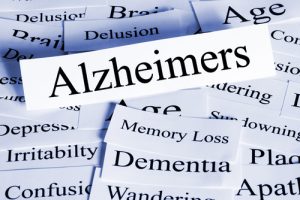
U.S. Sen. Shelley Moore Capito (R-WV) on Feb. 7 introduced a bipartisan, bicameral bill that would tackle Alzheimer’s disease on multiple fronts with the goal being to find a cure.
“The CHANGE Act takes a multi-prong approach to help the millions of Americans who are battling or are affected by this devastating disease,” said Sen. Capito, who was joined by U.S. Sen. Debbie Stabenow (D-MI) in introducing the bill, which aims to speed up treatment progress in advance of the roughly 16 million people across the nation who are expected to be diagnosed with Alzheimer’s by 2050.
U.S. Rep. Peter Roskam (R-IL) on Feb. 7 introduced companion legislation, H.R. 4957, in the U.S. House of Representatives. He was joined by U.S. Rep. Linda Sanchez (D-CA) in introducing the bill. The bill has been referred to the House Committees on Energy and Commerce, and Ways and Means.
“Having lost both of my parents to Alzheimer’s, I truly understand the emotional, physical, and financial toll it takes on patients and their caregivers,” Capito said. “This legislation will encourage early assessment and diagnosis to help lessen that burden and bring us one step closer to a cure.”
The CHANGE Act, or the Concentrating on High-value Alzheimer’s Needs to Get to an End Act, S. 2387, supports early assessment and diagnosis, caregiver relief, and treatment development.
Alzheimer’s disease is the only illness among the top 10 U.S. causes of death that has no effective prevention, treatment or cure, according to a summary provided by Capito’s office, and diagnosis can be delayed due to the lack of any uniform screening and diagnostic tools.
If enacted, S. 2387 would call on the U.S. Health and Human Services Department’s Centers for Medicare and Medicaid Services to identify reliable uniform cognitive impairment detection tools and incentivize their use, according to the summary.
The bill would also direct development and testing of a comprehensive care continuum for both patients and caregivers under Medicare authority that follows the model of Programs of All-inclusive Care for the Elderly, known as the PACE Program. The legislative summary also noted that another provision would develop a coverage and payment model providing family caregivers dementia-specific training and certification so that they could provide care at the level of a home-health aide and be compensated.
“Alzheimer’s is a heartbreaking disease that affects the whole family,” Sen. Stabenow said. “We have strong partners in the fight against Alzheimer’s in the House and Senate and I will continue working across the aisle to move this bill forward.”
U.S. Sen. Roger Wicker (R-MS) signed on as an original cosponsor to S. 2387, which has been referred to the Senate Finance Committee for its consideration.
Rep. Roskam said, “The cruelty of Alzheimer’s holds no prejudice. This legislation will aid in earlier identification and treatment of this disease and provide caregivers appropriate training to care for loved ones experiencing cognitive decline.”
Organizations active in Alzheimer’s disease research and treatment welcomed the legislation, including Helen Matheny, co-founder of Women Against Alzheimer’s, who said the new bill continues to make Sen. Capito “a champion for the millions of individuals living with Alzheimer’s disease and their caregivers here in West Virginia and across the country.”
George Vradenburg, co-founder and chairman of UsAgainstAlzheimer’s, noted that the CHANGE Act fosters multiple approaches to improving research, treatment and care that are “essential to moving us closer to getting innovative treatments to more families affected by the disease.”



